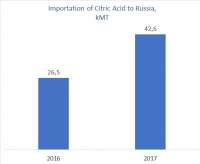

Published on February 1, 2018
Yuri Ivanov
My career in chemical distribution started in the mid of 90s and it was the time when Russian economy was undergoing the huge changes caused by the recent collapse of the Soviet Union and the revision of local economic model which followed. Many production plants were stopped and the same time the production of new products not habitual for Soviet time started developing very fast. Among the latter there were the new productions of foods and beverages which consumed Citric Acid. By some coincidence all together 2 local Citric Acid plant were closed approximately at the same time: in St-Petersburg and in Vyborg of Leningrad Area.
Simultaneously the Western producers of soft-drinks and candies like Bravo plant and Chupa-Chups just started their operations in Russia. The all needed Citric Acid as a pH regulator and the only source of this material became the importation. Thus my first blockbuster in chemical sales was Citric Acid Monohydrate (CAM).
Those were the days!
We hardly managed to customs clear the material as the customers were picking up the whole truck load of CAM just from the customs warehouse!
Since that time and till now I feel a kind of nostalgia about this product and now I am happy to share with you my latest observations of Citric Acid market in Russia.
1. The Stoppage Of Citrobel
In December 2017 it became known that the only Russian Citric Acid producer Citrobel does not produce Citric Acid any more.
The company decided to stop the production after being suited by The Federal Service for Supervision in the Sphere of Environment (Rosprirodnadzor).
In April 2017 the Court of Oktyabrsky District of Belgorod city ceased the plants functioning for 90 days. In the end of June the Judge has prolongated the cease till end of September 2017. The plot of land used by the plant for waste and for discharge of sewage waters were confiscated.
In the time of the Soviet Union the plant was functioning on the specially territory provided by the State. In Russian Federation Belgorod Citric Acid plant (Citrobel as it was later called) remained the only producer of Citric Acid after the closure of Leningrad Plant Of Citric Acid and Vyborg Plant Of Citric Acid in 1990s.
Belgorod Area administration and the owner of Citrobel are working now on the programs of production switch and the land reclamation. It is not known yet what the plant will produce in future.
Prodimpex holding where Citrobel belongs to informed that after the implementation of those programs Rosprirodnadzor will resign the claims valued 3,7billions of Roubles for soil damage.
The claims were initiated after numerous claims on foul smell from citizens.
2. Citric Acid Market in Russia
But Citrobel was not the only player on Russian market of Citric Acid. In the best case it covered only 40% of demand which is estimated as 45 kMT/ann.
The rest came from the importation where China was the leader. After the closure of production at Citrabel in Spring 2017 the only source of Citric Acid in Russia became the importation.
The importation volumes reached 43kMT in 2017 which was expectedly higher than in 2016 when Citrobel was yet in function.
In the first months after the closure the prices expectedly flew up, but then stabilized as more and more new players came in.
3. Importation Duty
There is a fixed import duty for Citric Acid in Russia - 0,05 Euro/kg. It is not a usual way of customs taxation since for most of chemical good the duty is measured in percentage and 5% is the typical value for chemicals.
The fixed duty on Citric Acid was aimed from the one hand to support the only local producer and from the one hand to fight the under-invoicing practiced by some importers.
Now the tax support of the local producer has no sense since there is no longer a local producer.
Will it effect the customs importation duty? A good question to Russian government.
4. The Prospect
4 years ago Russian Gvernment announced the program of import substitute. The meaning was to develop the local production in every possible industrial segment targeting to make Russian economy less dependent on the importation from abroad.
One could argue if this policy proved to be successful or not but obviously the localization of food production was the most evident result of this program. Citric Acid is used as a pH regulator in many areas of food industry and one could expect that the consumption of Citric Acid will continue growing as the growth of local food production continues.
Thus the growth of Citric Acid importation could be forecasted still in 2018.
04.05.2018, 3999 просмотров.